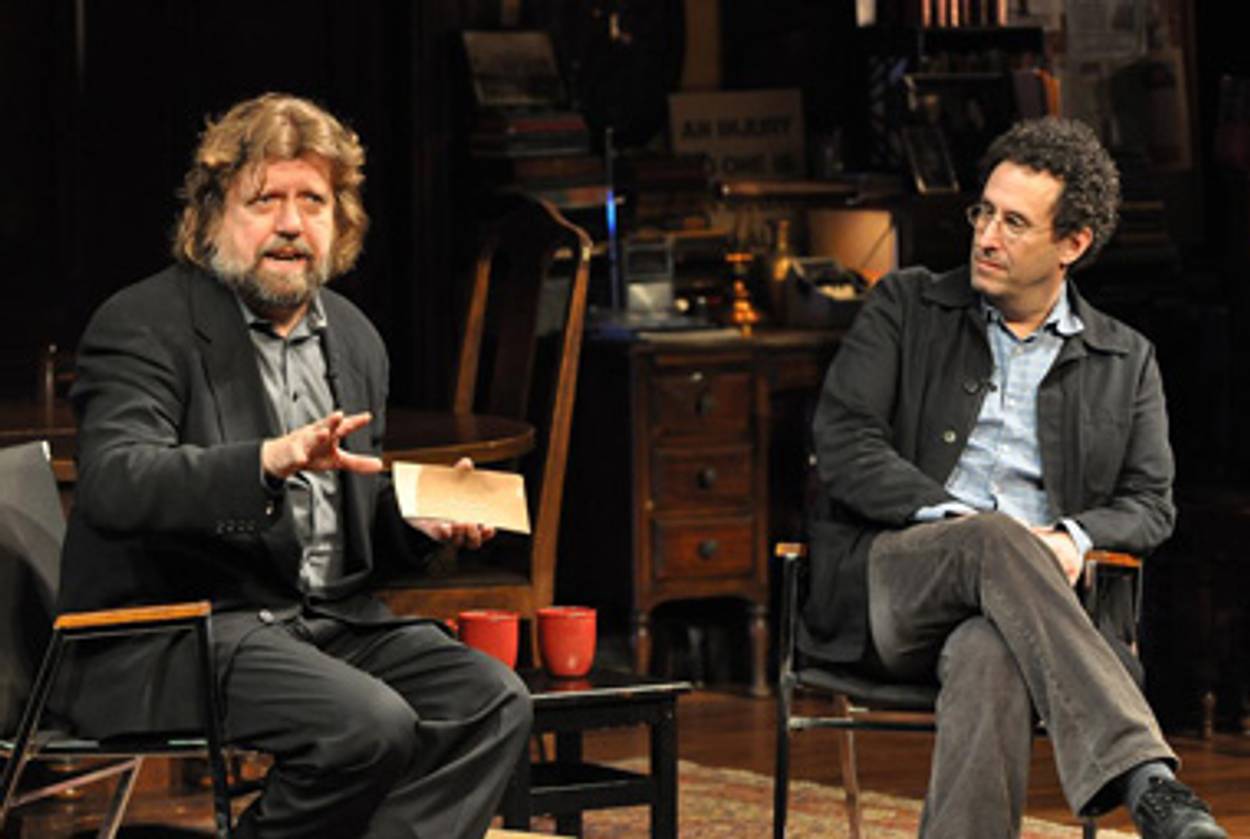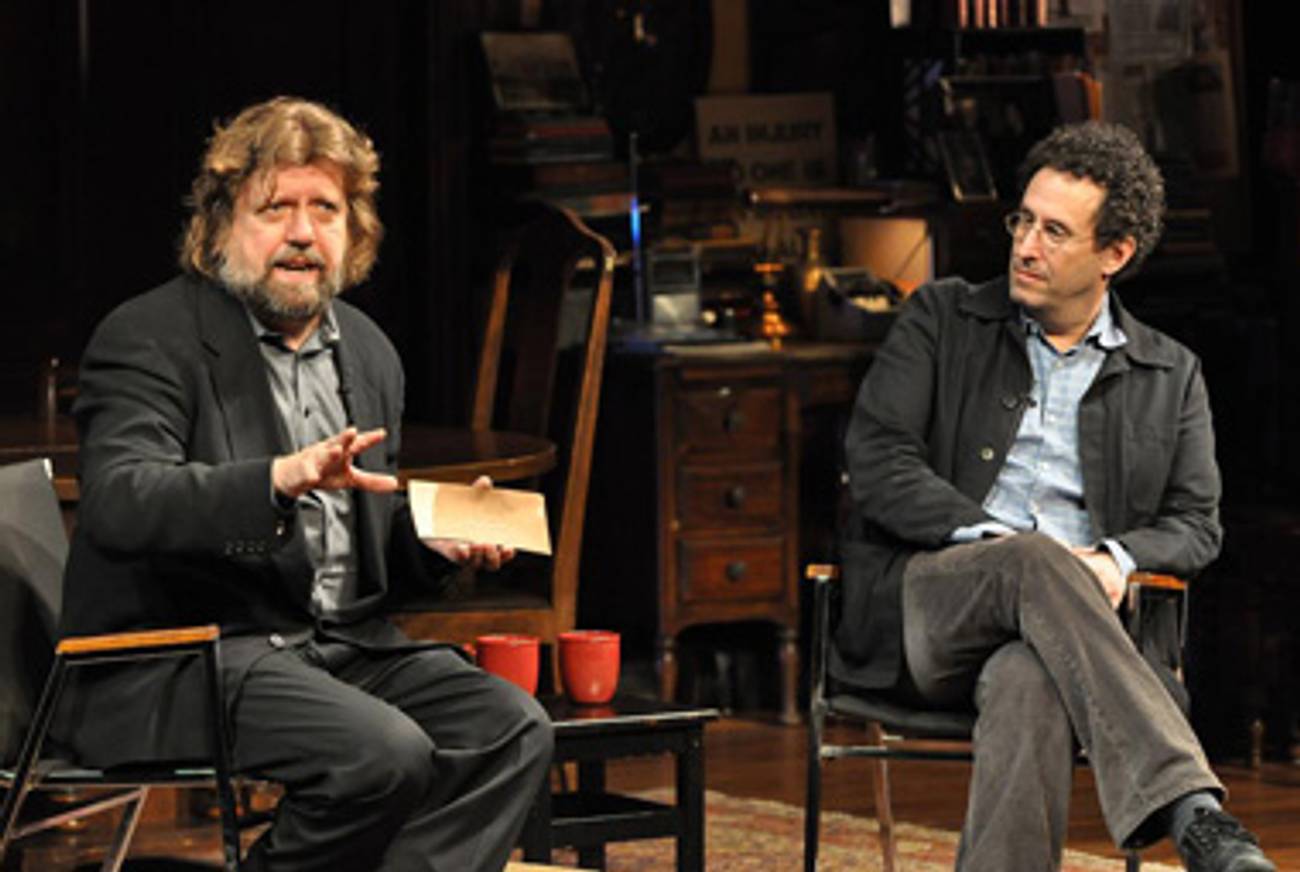Kushner Goes Public
An intelligent spectator’s guide to who the playwright really is




Tony Kushner’s talk at the Public Theater last night was scheduled on the occasion of the staging of his new play there, but the attendees in animated conversation beforehand were not, of course, discussing his new play. Kushner spoke directly about the City University of New York’s Board’s decision to prevent John Jay College from awarding him an honorary doctorate only briefly. Of a planned meeting today of the executive committee, which is expected to overturn the Board’s decision, he said, “We’ll see what happens.” Of his views on Israel, he cited the letter he sent to the Board. He referred to CUNY Board Chairman Benno C. Schmidt, Jr.’s “statement that’s sort of an acknowledgement of wrongdoing,” calling it not quite an apology but “apology-ish” (Kushner’s interviewer, the Public Theater maven Oskar Eustis, quoted Schmidt’s admission that the Board “made a mistake of principle, and not merely of policy”). He said that while he knows that much of the support for him has nothing to do with him per se, he also remarked, “I have never in my entire life experienced the volume of warmth and support … it’s just completely overwhelming.” And he did briefly comment that the reaction on his behalf indicates that “we’re in a different place in this country on our understanding of the crisis in the Middle East.” He added, “And what this guy”—CUNY Board member Jeffrey Wiesenfeld—“wanted to happen, which was a rally to this ring of a bell, didn’t happen—quite the contrary.” As far as the evening’s explicit commentary went, the rest was silence.
It is a bit of unlucky timing that the opening of An Intelligent Homosexual’s Guide to Capitalism and Socialism With a Key to the Scriptures last week coincided with the end of the academic year and, so, with the CUNY to-do. Although you could consider it lucky timing under the no-such-thing-as-bad-P.R. paradigm, demand for a three-and-a-half-hour play with a 14-word title is relatively inelastic, and, anyway, if critics such as Tablet Magazine contributing editor Seth Lipsky (as well as the Wall Street Journal editorial page, which echoed his argument) are dead-wrong about anything (actually, they are about many things) it is that, in the words of Lipsky’s New York Sun, “you would need a late-model electron microscope spectrometer to separate Mr. Kushner’s politics from his art.” All due respect, but has he read the plays? “It is precisely the liberal politics in his art that has caused the academic elites to rise up on his behalf,” the Journal added. Life is too short to enumerate all the ways that is wrong, and how wrong it is.
Besides, Kushner’s personal politics are in one way somewhat less lefty than his critics say (though very harsh on Israel’s policies, Kushner is not, as Wisenfeld has accused, a “Jewish anti-Semite,” much less a strict anti-Zionist), and in another way much less lefty—repeatedly he made the case for incrementalist, ameliorative liberalism, chastising progressives who languish, like pigs in mud, in the “luxury of powerlessness,” and eagerly praising President Obama precisely for his compromises. “People say all he’s interested in is getting re-elected,” he observed. “That’s all I’m interested in!” But the main point is that if Kushner’s rhetoric can at times be caricatured as that of the Upper West Side bubble—George W. Bush is a “monster,” for example—the man nonetheless is always acutely, scrupulously, at times absurdly aware of exactly what the other side’s position is.
Kushner and Eustis were introduced by actress Cynthia Nixon (who was herself introduced by the director of the Public’s talks series, Jeremy McCarter—who, disclosure, is a friend). Her hair is longer now and dirty-blonde—she resembles the young woman she was in Robert Altman’s Tanner ‘88, made in that year—but spoke in the acerbic tone we have come to know well through her portrayal of Sex and the City’s Miranda Hobbs. She described her very long relationship with the Public and nearly as lengthy relationship with Kushner (she played Harper in the early-‘90s production of Angels in America—the role played by Mary-Louise Parker in the HBO version). She recounted that a friend had just emailed her, “Does it strike you that the events of the last few weeks, months: The Arab spring, killing Bin Laden, the CUNY affair … are all aspects of a Tony Kushner play?” This new play, she said, has at its center a patriarch considering suicide—“It’s like Death of a Salesman if Willie Loman actually consulted with people.” What I’m trying to get across is that Nixon killed.
Then Kushner and Eustis came out, the former in brown slacks, a blue shirt, and a black jacket (longer than a sport coat), the latter in a black suit, and with the trademark booming voice and circle of facial hair that practically compel one’s fingers to type the word “leonine.” Eustis commissioned and directed the very first production of Angels, we learned, and in fact was the very first person whom Kushner, back in its earliest stages, told the title to. Eustis’s response was: “Write the fuck on.” Thank God Kushner did—Angels in America is one of the greatest glories of the past half-century of American culture. It is also, in its unbelievably brash and wide scope, concern for universal human nature and social justice, New York centric-ness, and specific characters—Roy Cohn, Ethel Rosenberg, a young stand-in for Kushner—an unmistakable piece of American Jewish culture. (And also of American gay culture: If, as Susan Sontag wrote a few years after Kushner was born, “The two pioneering forces of modern sensibility are Jewish moral seriousness and homosexual aestheticism and irony,” then Angels may stand, in time, as the apotheosis of that modern sensibility.)
Eustis began by pulling out a brown envelope. It seems the Public building, on Lafayette Street in lower Manhattan, had been the headquarters of the Hebrew National Aid Society, and, in the course of current renovations, discovered in the wall—literally, in the cement, under one of the staircases—was this envelope, which contained union cards in Hebrew. Unions are a big theme of Intelligent Homosexual’s Guide (or “iHO,” as Kushner calls it). Discussing unions involved one of Kushner’s signature demonstrations of his fundamental fair- and open-mindedness. I don’t want to sugarcoat him too much: His rhetoric can be crude. Attacks on unions, he said, were “Reaganite crap,” and that was probably one of his nicer descriptors. But before he launched into that, he recited—very clearly by compulsion—all of the arguments against unions, about how they make the money go to the wrong people, and are corrupt, and all that (and all that, going on and on), all the “Reaganite crap.” He devoted far more time to the brief against his side than anyone else I can conceive of would have. The man is obsessed with knowing all about the other side, and indeed in plays such as Angels, he at times gives the other side the best lines. (You weep at Roy Cohn’s death in Angels, and are forced to watch Kaddish said for him, even as other parts of the play have shown Cohn to be the horrorshow he in fact was.) It was telling that Nixon, who has seen iHo, asked Kushner in her introduction which side he fell on in a debate that two of his own characters in his own play have. Just reading the play and seeing it performed, there is really no way to know!
During the final, question-and-answer section, somebody asked if King Lear haunted iHo and its depiction of a dying patriarch and his fraught relationship with his daughter. Kushner, who with iHo has written the closest approximation yet of the American family drama, acknowledged that Lear as well as Chekhov’s Uncle Vanya were the two non-American plays that he felt influenced by. He viscerally reacted to the Shakespeare comparison—“it’s in bad taste,” he joked—but earlier, he had spoken of Shakespeare so earnestly, involuntarily miming somebody shielding himself from the sun’s rays when speaking of the Bard, in a way I vaguely recalled. And I didn’t realize where I recalled it from until Kushner cited his old college Shakespeare professor, Edward Tayler. Mainly because he is the professor in David Denby’s book about it—but also because he remains a legend in Morningside Heights—Tayler is the professor most associated with Columbia University’s Core Curriculum, an overbearingly earnest two-year program in which all College undergraduates read the “Great Books” of Western literature and philosophy. (My favorite cultural artifact of the Core is this picture of Anna Wintour’s daughter lugging a copy of the Iliad to a Fashion Week runway—after all, Columbia first-years are expected to have the first six books read by day one.) It is a rigorous, somewhat bizarre, enormously enriching experience that Kushner and the president he loves (and, as you surely have guessed, I) underwent.
The Core is unabashedly dorky—in the way that you read the actual books themselves firsthand; in the way you discuss them, seminar-style, as though you are the first people to come upon them; in the way that you study them in a neo-classical library with the author’s names chiseled on the top; in the way that you find yourself discussing them with your fellow students long after you need to—and as Kushner discussed Ibsen and Shakespeare and Nietzsche with this unabashed dorkiness, I realized that he remains fundamentally a Core guy. Which is to say, he never really left, and continues to discuss things about which he is inexpert (like, say, the Mideast conflict) as though he is an expert, and he said some controversial things, and didn’t realize there might be blowback. Is there some naivete in this? Sure. But mainly there is open-mindedness and the spirit of free inquiry, which are only foggy-headed abstract concepts if we permit that to happen. Kushner, who produces some of our country’s masterworks in his day job and prods in other arenas in his spare time, is exactly what we should want our intellectuals to be and exactly what we should want our universities—particularly our public universities—to honor. Not that we need worry: If it doesn’t today (and all indications are that it will), CUNY will eventually see the error of its ways. The world only spins forward.
Marc Tracy is a staff writer at The New Republic, and was previously a staff writer at Tablet. He tweets @marcatracy.